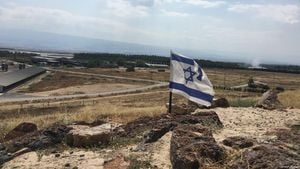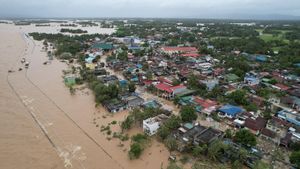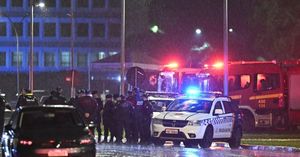ATHENS, Ga. — The courtroom was tense as the trial of 26-year-old Jose Ibarra began, accused of murdering Laken Riley, a 22-year-old nursing student on the University of Georgia campus. Special prosecutor Sheila Ross opened with harrowing details, stating Ibarra was "hunting" for women when he encountered Riley during her morning run on February 22. During opening statements, she charged: “When Laken Riley refused to be his rape victim, he bashed her skull in with a rock repeatedly.” This assertion set the stage for what was bound to be a gripping and emotionally charged trial.
Riley was discovered dead later the same day, covered with leaves, after her friends expressed concern when she didn't return from her jog. Ross alleged Ibarra’s intent was clear: he targeted Riley, leading to violent confrontations. To support her claims, she promised forensic, digital, and video evidence would connect Ibarra directly to the crime. Notably, she mentioned data from Riley’s new Garmin watch, which indicated her heart rate surged during the encounter and stopped shortly thereafter. “She fought for her life. She fought for her dignity, and it’s through her struggles we have evidence to pinpoint the accused,” Ross declared.
According to the prosecution, the timeline was chilling. Riley had set out for her run at 9:03 AM, and just minutes later, at 9:10 AM, her watch registered she stopped suddenly—a signal experts believed marked the beginning of her struggle against Ibarra. Confoundingly, her Garmin watch, activated SOS mode, signaling distress at 9:11 AM. The muffled 911 call during which Riley desperately tried to seek help was played for the court, evoking tears from her family. The dispatcher was heard calling, "Hello, can anyone hear me?" but silence followed.
Prosecutors insisted Ibarra left behind several pieces of damning evidence: his thumbprint on Riley's phone, found beside her corpse, and traces of his DNA underneath Riley's fingernails, indicating she fought back fiercely. Detectives had found Ibarra with scratches on his body, injuries they argued were consistent with someone who had been involved in a struggle.
But the trial was not without defense. Ibarra's attorney, Dustin Kirby, dismissed the prosecution's claims as circumstantial. He questioned the validity of the evidence, urging the court to remain skeptical about speculations surrounding Ibarra’s actions and the charged intent behind them. “We waived the right to trial by jury,” Kirby noted, emphasizing the need for doubt about Ibarra's guilt stemming from evidentiary assertions made by the state.
Ibarra, identified as having entered the U.S. illegally from Venezuela, faced serious charges including malice murder, felony murder, and several violent offenses. If convicted, he could face life imprisonment, potentially with the chance of parole.
The emotional aftermath of the case reachesextensive media coverage and public scrutiny alike. Riley's tragic death sparked significant conversations surrounding campus safety and immigration, thrusting the case through the spotlight and inciting national debates over these sensitive issues.
According to Ross, evidence would detail Ibarra’s actions leading up to and after the alleged crime—specifically, surveillance footage demonstrating his movements on the campus. Prosecutors described how around the time of Riley's death, Ibarra was captured on video discarding items believed to be linked to the murder: clothing and gloves found nearby contained Riley's blood.
“He went hunting for females,” Ross reiterated, asserting the harsh reality faced by women on college campuses and the broader societal problem of gender-related violence.
Testimony revealed chilling details of Ibarra’s alleged prior conduct. On the same day, he had attempted to enter another female student's apartment. When the student called 911 near 8 AM reporting someone trying to access her home, images from social media suggested he was wearing similar clothing to what he wore during his bout with Riley. This raised eyebrows about his potential patterns of predation.
Riley had only recently transferred to Augusta University, pursuing her studies after three years at UGA, her family having hoped for her brighter future. The trial will not just serve as a pursuit of justice for her family but may also push for broader reforms and educational outreach about safety protocols on campus.
The prosecution promised compelling forensic charts, timelines, and testimonies illustrating the undeniable connections between the defendant and the violent act against Riley. Meanwhile, Ibarra’s family sat visibly distressed, maintaining his innocence and hoping for vindication.
Witness statements are expected to address Riley's final moments, depicting not just tragedy but her unyielding spirit. The defense's strategy aims to question the credibility of witness observations and forensic analysis. The public, alongside Laken’s grieving family, remains fixated on the courtroom’s progress, with many hoping for transparency and accountability.
Diving deep, the trial has become emblematic of the larger issues of violence against women and immigration policy—a dual problem prompting diverse perspectives.
With both sides gearing up for what promises to be lengthy testimony, audience members are left to grapple with the gravity of the situation, where justice meets painful truth.
The trial will continue to unearth numerous layers of this harrowing case, bearing witness to both Laken's struggle and the quest for justice mounted against Ibarra's alleged actions, redefining both personal and collective narratives.
Emotions will undoubtedly soar as more evidence and details emerge, with Laken’s family at the heart of it all, holding onto hope, healing, and the desire for justice amid the overwhelming anguish.
Regardless of the outcome, this trial will likely serve more significant purposes than casting blame—renewing discussions about how to effectively protect young women everywhere and facing the sobering realities of predatory behavior on college campuses.
It is within this emotionally charged courtroom, with suspense hanging thick, the tragic tale of Laken Riley takes center stage as America's attention focuses sharply on the prudent need for advocacy surrounding violence against women and the tales hidden within shadows.



